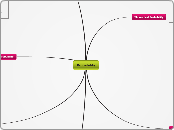Probability
Theoretical Probability
Book Definition: Theoretical probability assumes that the probability of each outcome in the sampe space. It is the probability that should occur.
P(E)= n(e)/n(s)
Example:
If we toss a coin, what is the possibility a tail will show up?
Answer: 0.5% or 50%
Solution:
1) When you toss a coin there are only two possible outcomes: a head or a tail
2) So the options for tossing a tail is 1 out of two
1/2 = 50%
Video: Theoretical Probability
Tree Diagram Method
Tree Diagram Video
Definition: A tree diagram shows all the possible outcomes of an event. All possible outcomes of an event are shown by a tree diagram.
Experimental Probability
Book Definition: An experiment with a number of possible outcomes is performed repeatedly. Le'ts say n times and that specific outcome E occurs r times. The experimental probability denoted by Pe(E), that E will occur on any given trial of the experiment is given by:
Pe(E) = r/n
Theorem: The Law of Large Numbers
If an experiment is performed repeatedly, the experiment probability of a particular outcome more and more closely approximates a fixed number as the number of trials increases.
Example:
A coin is tossed 60 times. 27 times it landed on heads. What is the experimental probability of getting heads?
Answer: 27/60 or 45%
Steps:
Step one: number of times that event occurs/ total number of trials
Step two:number of times heads appeared = 27
Step three: total number of experiments = 60
Steph four: Experimental probability of landing of heads is 27/60
Video Link:
This is a Youtube video that describes experimental probability. It also shows the audience multiply example problems on how to solve experimental probability. It is very helpful for visual learners.
Conditional Probability
Defintion: The probability that an event will occur, given that one or more other events have occured
Example:
2 blue and 3 red marbles are in a bag.What are the chances of getting a blue marble?
Answer: 2/5
However after taking one out you change the probability
Therefore the next time:
1)If you got a red marble before, then the chances of getting a blue marble are 2/4.
2) If you got a blue marble before, then the chances of getting a blue marble again is 1/4.
Compound Events
Definition: The probability of two or more events happening at once.
Video on Compound Events
Or/And
Or Definition:
You will be adding the probabilties to get the answer
(p)(a) + (p)(b)
Add Definition:
You will be multiplying the probabilities to get the answer
(p)(a) x (p)(b)
